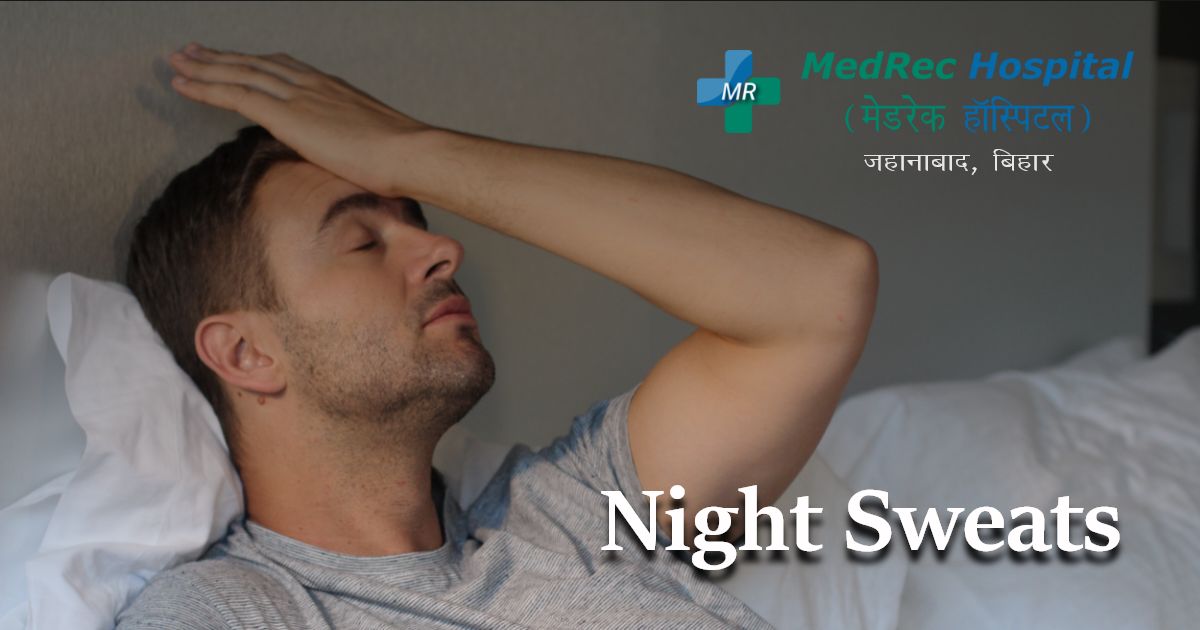
Night Sweats : How to check if you have Night Sweats?
680
Excessive sweating at night is often referred to as night sweats. Many individuals find them to be an uncomfortable aspect of life, and they may be connected to melancholy and slumbering issues.
Even while night sweats are a typical menopausal symptom, other medical problems and some drugs might also cause them.
Night sweats are often not a significant symptom. Even so, it is crucial to understand when to be checked out if you experience night sweats. If the temperature in the room or your bedding is too high, it is natural to perspire as you sleep.
Even when the room where you are sleeping is chilly, night sweats occur when you perspire so heavily that your pyjamas and mattress are drenched.
In both adults and children, night sweats can happen.
Causes
If the temperature is too high, it is common to perspire at night. However, some people routinely get deluged with nocturnal sweats. Hot flashes and nocturnal sweats are common menopausal symptoms for females. Other causes include:
- Other medical disorders, such as infections like TB or HIV, cancers like leukaemia or lymphoma, and others may also contribute to night sweats
- Anxiety disorders
- Hyperthyroidism
- Hypoglycemia (low blood sugar)
- Night sweats can also be a side effect of chemotherapy and radiation therapy for cancer. Men who had their testicles removed to treat prostate cancer are likewise susceptible.
- As a side effect of a drug you are taking, you could occasionally get night sweats. Some antidepressants, hormone therapies, and opioids may fall under this category.
- Consuming excessive amounts of coffee, alcohol, tobacco or medications might also make you sweat at night.
How to check if you have Night Sweats?
Typically, night sweats are not a reason for alarm. They can be a sign of a more serious condition that requires medical attention.
In menopause, which typically begins around age 50, night sweats are prevalent. However, it is crucial to consult your doctor if you have night sweats and other menopausal symptoms before turning 40. In this instance, primary ovarian insufficiency could exist.
Additionally, it is crucial to consult a doctor if your night sweats start to occur regularly, interfere with your sleep, or are accompanied by other symptoms. A dangerous medical problem may be present if you experience night sweats along with a high temperature, a cough, or unexplained weight loss.
Night sweats may be a sign of HIV or lymphoma in people.
Symptoms
Sweats at night can be unpleasant and interfere with your sleep. They often do not warrant severe worry. Occasionally, they could be brought on by a condition that has to be treated.
Your physician can assist in determining the origin of your night sweats. Additionally, they can offer advice on how to stop or handle night sweats. They could suggest a change in lifestyle, medicine, or other therapies depending on the underlying problem.
People can often have waking night sweats that scare them, along with a very high fever (or feel hot and shivery), a cough, or diarrhoea. Symptoms can also include suffering nocturnal sweats and unnecessarily losing weight.
Prevention
Some causes of night sweats may be prevented with changes in lifestyle. To lessen your chance of developing night sweats:
- Limit your alcohol and caffeine intake.
- Avoid using drugs and cigarettes.
- Consider purchasing a cooling mattress to sleep in a cooler atmosphere.
- Keep your weight at a healthy level.
- If you experience menopause, stay away from spicy food since it might make symptoms worse.
- Get quick medical assistance if you believe your night sweats are caused by an infection or another condition.
- Find out more about your illness, the available treatments, and ways to avoid night sweats by speaking with your doctor.
Treatments
Your doctor will take efforts to find and treat the underlying cause of your night sweats. Your precise diagnosis will determine your treatment strategy. The following are typical reasons for night sweats and their remedies:
Menopause. A change in lifestyle, such as avoiding alcohol and sleeping in cool environments, may assist with hot flashes and night sweats. If they do not work, hormone treatment can help you have fewer hot flashes and relieve other symptoms. Other treatments for hot flashes that your doctor could recommend include Paxil and gabapentin. Night sweats are another off-label application for venlafaxine.
Infection at the root. Antibiotics, antiviral medicines, or other treatments may be used to treat your infection, depending on the type that you have.
Cancer. Your physician could suggest surgery, chemotherapy medication combinations, or further therapies. Night sweats may also be managed with hormone therapy or other drugs as these therapies can also produce them.
Anxiety. Your doctor could advise using antidepressants or anxiety meds. They could also suggest treatment.
Hyperthyroidism. Treatment options for an overactive thyroid include medications, radioiodine treatment, and occasionally surgery.
Medications. Your doctor could change your dosage or suggest a different medication.
Drinking alcohol, using coffee, or using drugs. Limiting or avoiding these activities may assist to reduce night sweats. Your doctor might occasionally suggest medicine or treatment help you stop.
Your doctor could also suggest that you change your sleeping patterns. Wearing lighter pyjamas, removing the covers from your bed, or opening a window. Night sweats may be avoided and treated in the bedroom. Finding a cooler area to sleep in or using a fan or air conditioning may also be helpful.
For further information please access the following resources:
Emergency : +91 89686 77907
Front Desk : +91 98018 79584
Page last reviewed: Mar 20, 2023
Next review due: Mar 20, 2025







.jpg)
.jpg)
.jpg)
.jpg)
.jpg)
.jpg)